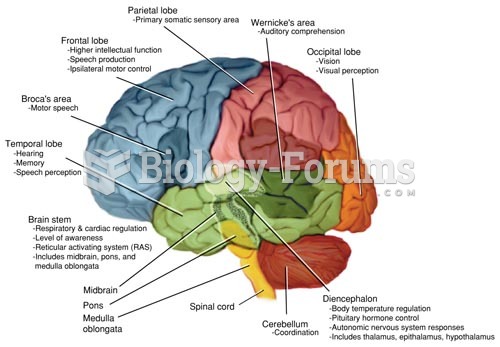|
|
|
The familiar sounds of your heart are made by the heart's valves as they open and close.
A seasonal flu vaccine is the best way to reduce the chances you will get seasonal influenza and spread it to others.
Though the United States has largely rejected the metric system, it is used for currency, as in 100 pennies = 1 dollar. Previously, the British currency system was used, with measurements such as 12 pence to the shilling, and 20 shillings to the pound.
Vampire bats have a natural anticoagulant in their saliva that permits continuous bleeding after they painlessly open a wound with their incisors. This capillary blood does not cause any significant blood loss to their victims.
Nearly 31 million adults in America have a total cholesterol level that is more than 240 mg per dL.







